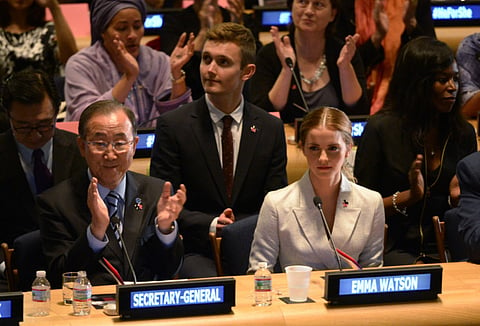Emma Watson: Men must join fight for equality
‘Harry Potter’ actress gives moving speech at United Nations calling on everyone to push for women’s rights

Emma Watson delivered a powerful speech on gender equality to the United Nations in New York on Saturday, calling on men to join the battle for equal pay and access to education.
Watson, a United Nations Goodwill Ambassador, was speaking at the launch of the HeForShe campaign.
Early in the 10-minute speech (watch it here), the 24-year-old revealed the sexism she has experienced throughout her life, saying it started at the age of eight when she was branded “bossy” for wanting to direct school plays.
She then called out “certain elements of the media” for sexualising her aged 14. She began acting in the Harry Potter films when she was 11.
She continued: “At 15, my girlfriends started dropping out of their sports teams because they didn’t want to appear “muscly”...at 18, my male friends were unable to express their feelings.”
Watson also appealed for women and men to reclaim the use of the word “feminism”, calling herself a feminist and adding that she saw the word as “uncomplicated”.
“But my recent research has shown me that feminism has become an unpopular word. Women are choosing not to identify as feminists. Apparently, I am among the ranks of women whose expressions are seen as too strong, ‘too aggressive,’ isolating and anti-men, unattractive, even. Why has the word become such an uncomfortable one?”
Deploring the lack of involvement of men in the fight for women’s equality, Watson — who graduated from Brown University earlier this year with a degree in English literature — received a round of applause when she told the men watching: “Men, I would like to take this opportunity to extend your formal invitation.”
“How can we affect change in the world when only half of it is invited or feel welcome to participate in the conversation,” she continued.
“Men don’t have the benefits of equality either. We don’t want to talk about men being imprisoned by gender stereotypes but I can see that they are. When they are free, things will change for women as a natural consequence. If men don’t have to be aggressive, women won’t be compelled to be submissive. If men don’t need to control, women won’t have to be controlled.”
Sign up for the Daily Briefing
Get the latest news and updates straight to your inbox



